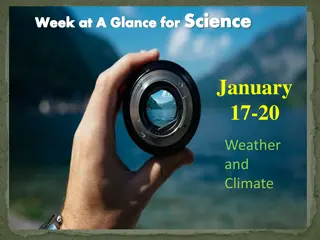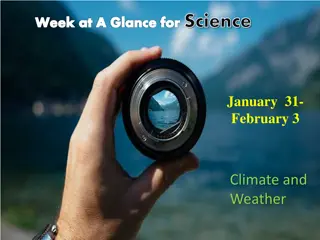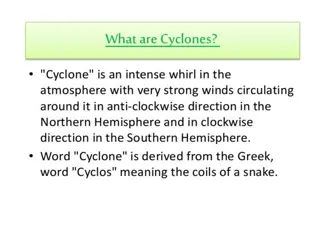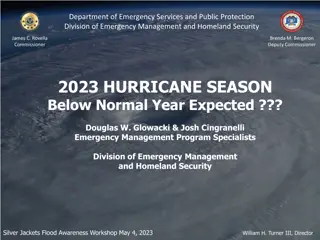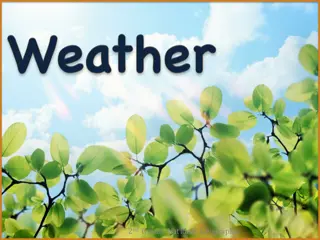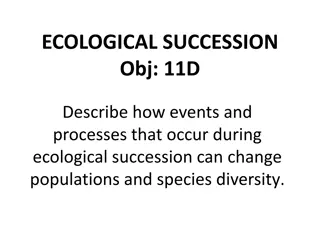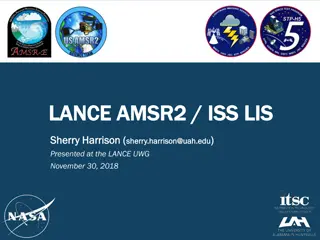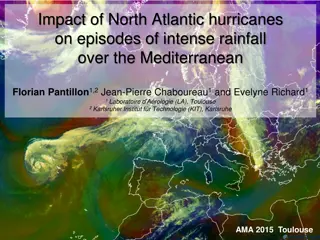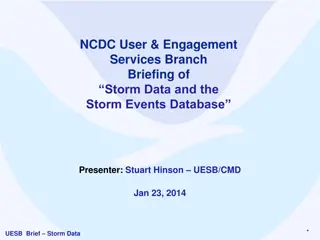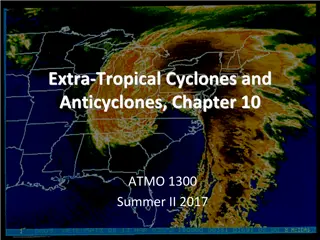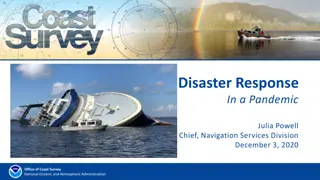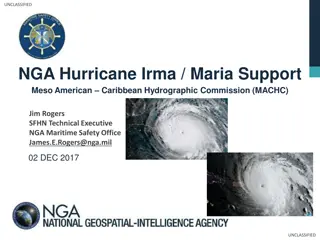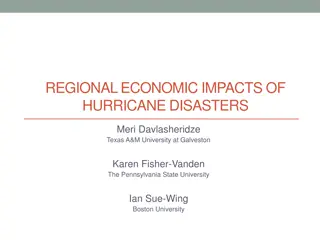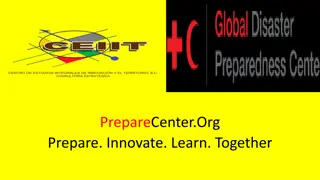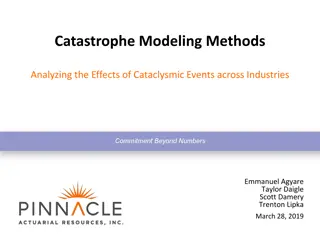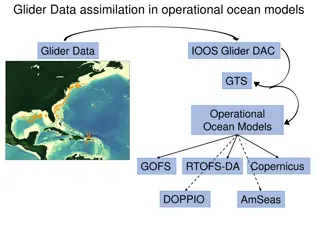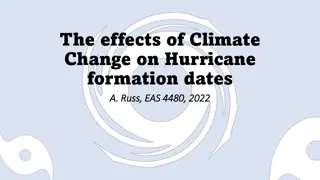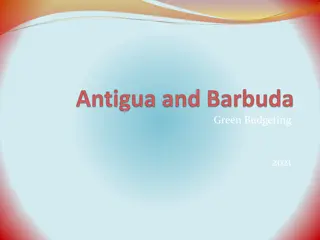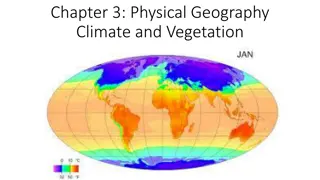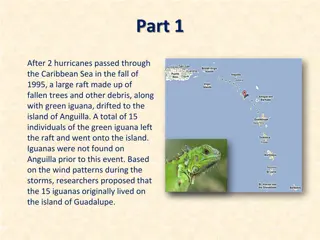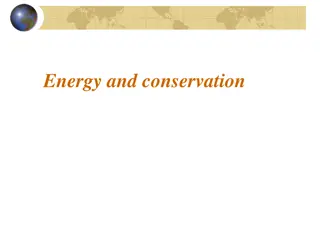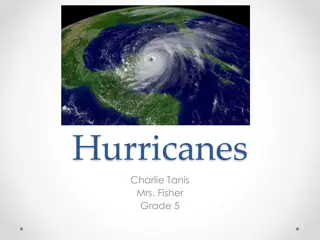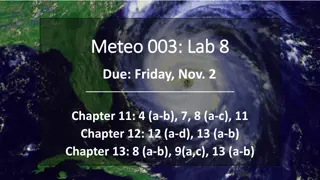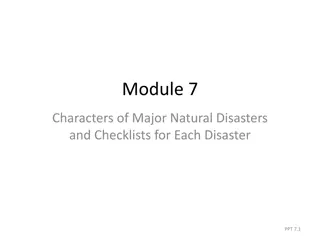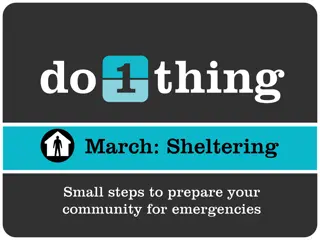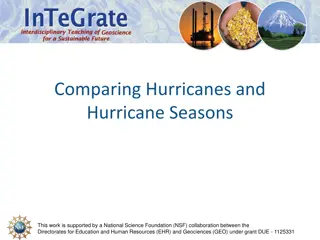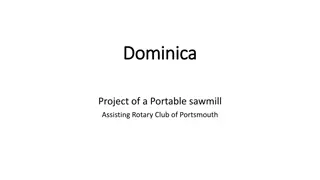Understanding Climate and Weather Interactions in Science
Explore the impact of the sun, land, and water on climate and weather patterns through investigations and models. Learn about energy transfer processes, atmospheric composition, and weather phenomena like tornadoes and hurricanes. Gain insights into how unequal heating and Earth's rotation influence
7 views • 18 slides
Science Week at a Glance: Climate and Weather Insights
Dive into a week of science exploration focusing on climate and weather phenomena. From analyzing atmospheric layers to understanding the impacts of moisture on weather patterns, this overview covers a range of topics including greenhouse gases, hurricanes, wind systems, and meteorological events. E
3 views • 6 slides
Understanding Tropical Cyclones: General Characteristics, Types, and Origins
Tropical cyclones, developed in the region between the tropics of Capricorn and Cancer, exhibit unique characteristics such as varying size and velocity. They primarily impact coastal areas, known for low pressure centers and lack of temperature variations. These cyclones are classified based on int
0 views • 15 slides
2023 Hurricane Season Forecast and Preparedness Information
The Department of Emergency Services and Public Protection Division of Emergency Management and Homeland Security provides insights on the 2023 hurricane season, predicting a below-normal year. With neutral ENSO conditions and warm Atlantic sea surface temperatures, coastal residents are advised to
0 views • 13 slides
Exploring 2nd Grade National Geographic: Weather, Tools, and Natural Disasters
Dive into the fascinating world of weather phenomena with 2nd-grade National Geographic resources. From predicting weather using clouds to learning about thunderstorms, hurricanes, and tornadoes, this educational journey also covers weather tools and being prepared for natural disasters.
0 views • 15 slides
Understanding Ecological Succession and Its Impacts
Ecological succession is the orderly process of change in an ecosystem, where one community replaces another until a stable climax is reached. This progression affects populations and species diversity. The process involves primary and secondary succession, with events like tornadoes, hurricanes, an
0 views • 23 slides
Proactive Hurricane Preparedness: A Comprehensive Guide
Learn how to proactively protect your property from hurricanes with a detailed Hurricane Emergency Response Plan (HERP). This guide covers the essential phases of emergency management, including mitigation/prevention, planning, response, and recovery. Develop key roles and responsibilities, understa
1 views • 23 slides
LANCE AMSR2 and ISS LIS Updates
LANCE AMSR2 and ISS LIS provide real-time processing status and plans for various products like L2B Rain/Ocean, L3 Snow, L3 Sea Ice, and more. The AMSR Science Team leads the development with new algorithm updates planned. The data is used to monitor hurricanes like Florence and Michael. The website
0 views • 10 slides
Remote Impact of North Atlantic Hurricanes on Mediterranean Intense Rainfall
Study examines how North Atlantic hurricanes influence episodes of intense rainfall over the Mediterranean. It explores the upstream and downstream effects, showing how hurricanes interact with the midlatitude flow, triggering Rossby wave trains that lead to intense rainfall events. The research inv
0 views • 19 slides
NCDC User Engagement Services Branch Storm Data Briefing
This briefing presents information on storm data and the Storm Events Database provided by NCDC User Engagement Services Branch. It includes details on data contacts, data overview, data flow, and access to the Storm Events Database. The dataset covers a chronological listing of various weather phen
0 views • 7 slides
Impact of Catastrophic Events on Ecosystems
Catastrophic events like floods, hurricanes, and tornadoes have significant impacts on ecosystems, affecting physical structures, crops, food supplies, vegetation, animal species, disease, famine, and even land features. Hurricanes, for example, cause erosion, disrupt bayous, contaminate water, and
0 views • 22 slides
Understanding Extra-Tropical Cyclones and Anticyclones
Extra-Tropical Cyclones (ETC) occur outside tropical regions and are associated with fronts, unlike hurricanes. The Norwegian Cyclone Model explains the lifecycle of ETCs, starting at the polar front and describing cyclogenesis through wind shear patterns.
2 views • 75 slides
Building Resilient Houses in Hurricane-Prone Areas
Explore the world of engineering as you design and construct a house to withstand hurricanes near a Florida beach. Learn how engineers solve challenges, use creativity, and collaborate in teams to create a safer and more sustainable environment. Join the project supported by the Engineering Science
0 views • 31 slides
Coast Survey Disaster Response in a Pandemic: Operations Overview
This presentation showcases the Coast Survey's response to hurricanes and disaster situations in the year 2020, detailing the challenges faced and the innovative strategies implemented amidst the ongoing pandemic. From virtual tasking and survey planning to on-the-fly reporting and night processing,
0 views • 11 slides
Instant Communications in Emergency Situations: Clear Channel Network Protocol
The Gulf Coast of Texas faces frequent tropical storms and hurricanes, requiring clear communication strategies. Clear Channel's network of digital units provides vital messaging during emergencies, ensuring public safety. The network protocol involves coordinating messages with emergency management
0 views • 22 slides
NGA Support for Hurricane Irma and Maria in Meso-American Caribbean Region
The National Geospatial-Intelligence Agency (NGA) provided significant support during Hurricanes Irma and Maria, which devastated the Eastern and Central Caribbean Sea and parts of North America. This support included various products, damage assessments, storm surge inundation data, and more, aidin
0 views • 14 slides
Caribbean Hotel and Tourism Association's Annual Industry Performance Study 2019
The Caribbean Hotel and Tourism Association conducted its fourth annual Industry Performance and Outlook study in January 2019 to assess the state of the tourism economy. Results showed a positive outlook for 2019 with increased capital investments, rising revenues, and new hotel developments. Conce
0 views • 14 slides
Overview of CARICOM: History, Geography, and Present-Day Trends
CARICOM, the Caribbean Community and Common Market, comprises 15 member states and five associated member states. The region has a tropical climate with a rainy season from May to October and is prone to hurricanes from June to November. Historically, the Caribbean was pivotal in the Transatlantic S
0 views • 7 slides
Regional Economic Impacts of Hurricane Disasters: Research Findings and Projections
This study explores the regional economic impacts of hurricane disasters, examining factors such as property losses, vulnerable housing, unemployment rates, and other hazards. Empirical models are used to estimate future property damage, linking these to regional economic trends. The analysis also i
0 views • 9 slides
National Priorities for Climate Change Science and Knowledge in Canada
Canadians are experiencing firsthand the impacts of climate change, including wildfires, heatwaves, floods, hurricanes, and droughts. To address these challenges, foundational climate change science and knowledge are essential for understanding our changing environment, identifying impacts, making i
0 views • 9 slides
Experiences and Insights from Disaster Preparedness Workshops in Mexico
Explore the aftermath of hurricanes and storms in Baja California Sur, Mexico, and learn about disaster preparedness through workshops and train-the-trainer sessions. Discover the challenges faced, the importance of the Common Alerting Protocol (CAP), and the need to turn experiences into wisdom for
0 views • 23 slides
Understanding Catastrophe Modeling: Analyzing Effects of Cataclysmic Events
Catastrophe modeling is vital in risk management for various perils like earthquakes, hurricanes, and pandemics. This method, blending actuarial science, engineering, meteorology, and seismology, assesses risks probabilistically and deterministically. Learn about its history, components, and major p
0 views • 23 slides
Operational Ocean Modeling and Forecasting Systems
This content provides an overview of various operational ocean modeling and forecasting systems, including data assimilation processes, glider data, surface and subsurface data sources, forecasting models for hurricanes, and NOAA's hurricane forecasting models. It covers a range of technologies and
0 views • 16 slides
Impact of Rising Sea Surface Temperatures on Hurricane Behavior
Investigating the relationship between sea surface temperatures and hurricane behavior, focusing on the potential increase in out-of-season hurricanes with rising average SST. Data analysis from 1970-2020 reveals patterns in hurricane formation dates and categories, supporting the hypothesis of more
0 views • 13 slides
Green Budgeting 2021 Project Overview
The Green Budgeting 2021 project aims to enhance budgetary governance for green initiatives in Antigua and Barbuda. It covers accreditation, resilience to hurricanes, financial management, and project proposal evaluation. However, challenges like incomplete submissions and inadequate reporting need
0 views • 8 slides
Understanding Weather and Climate: A Comprehensive Overview
Explore the intricate relationship between weather and climate, uncovering why seasons change, the differences between weather and climate, and how extreme weather events like hurricanes, tornadoes, blizzards, droughts, and floods impact human lives. Delve into the dynamics of Earth's physical geogr
0 views • 16 slides
Evolutionary Forces and Speciation in Iguanas: A Study from the Caribbean
After two hurricanes in 1995 carried green iguanas from Guadalupe to Anguilla, evolutionary forces are expected to act on the new iguana population. A study hypothesizes allele frequency differences between the populations, potentially leading to speciation by 2050. The morphospecies concept was use
0 views • 10 slides
Understanding Energy Sources, Conservation, and Global Impact
Explores the main energy sources, focusing on fossil fuels and their implications, such as global warming and greenhouse effect. Discusses the process of fractional distillation for oil and the consequences of burning fossil fuels. Highlights the significance of mitigating climate change to prevent
0 views • 17 slides
Evolution of Collective Bargaining in Louisiana's School Systems
The Federation in Louisiana was chartered in 1979, eventually securing collective bargaining rights in 1991 after multiple cycles of school board elections. Currently, it is the only school system in the state with wall-to-wall collective bargaining. The Federation has established specific provision
0 views • 26 slides
Industrial Sector Overview and Stock Recommendations
The industrial sector overview highlights industries like Aerospace & Defense, Machinery, and top holdings such as General Electric and United Technologies Corp. Sector performance is closely tied to economic health, impacted by events like hurricanes. Relevant valuation matrices help in assessing s
0 views • 15 slides
Understanding Hurricanes: Nature's Most Powerful Storms
Hurricanes are the largest and most dangerous storms on Earth, characterized by high winds, heavy rain, and massive waves. This article covers how hurricanes form, where they occur, their impact on transportation, people, and the environment, as well as interesting facts about these natural disaster
0 views • 12 slides
Understanding Hurricane Dynamics and Impacts
Explore meteorological concepts related to hurricanes, including hurricane paths, storm surges, wind patterns, and energy transfer. Dive into topics such as contour heights, wind speeds, and angular momentum conservation to deepen your understanding of these natural phenomena. Don't miss out on valu
0 views • 13 slides
Comprehensive Training Module on Natural Disaster Preparedness
In this comprehensive training module, participants will learn about various natural disasters, their causes, and characteristics. They will also be equipped with the necessary knowledge to prepare emergency procedures checklists tailored to different types of disasters. The module covers a range of
0 views • 52 slides
Real-time Intensity Forecast Error Prediction Project
This project aims to provide real-time guidance on forecasting intensity errors of hurricanes by using regression formulas based on proxies and atmospheric conditions. The research focuses on relating forecast errors to initial conditions, environmental stability, and dynamical predictors to improve
0 views • 48 slides
Emergency Sheltering and Safety Tips for Disasters
Know what to do in an emergency - whether to evacuate or shelter in place. Practice tornado and fire safety plans with your family. Learn about storm shelters, sheltering guidelines for tornadoes and hurricanes, differences between tornadoes and hurricanes, and emergency evacuation shelters. Stay in
0 views • 23 slides
Understanding Hurricane Seasons and Comparing Hurricanes
This work explores the characteristics of hurricanes, the Saffir-Simpson Scale, Accumulated Cyclone Energy, and examples from the 2011 hurricane season. It delves into hurricane formation, impact on land, and the importance of seasonal outlooks in predicting and preparing for hurricanes. The collabo
0 views • 14 slides
Rotary Club Project in Dominica - Assisting with Hurricane Recovery
The Rotary Club of Portsmouth is involved in a project in Dominica to assist with hurricane recovery, including setting up a portable sawmill and aiding in rebuilding efforts after devastating hurricanes like Maria in 2017. The project aims to provide essential support such as securing homes, produc
0 views • 10 slides
